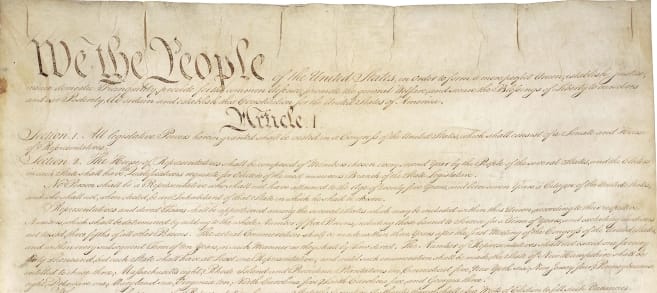At 237, the Constitution Is Showing Its Age And Vulnerability
The current political climate makes amending the Constitution impractical, dangerous, or both. Even so, legal and structural changes to our existing, vulnerable governing institutions are possible. All that's required is the will to make it happen.

In my lifetime, I've witnessed two presidents either covertly subvert or overtly try to overthrow the government that's based on our late 18th century national political charter. The current political climate makes amending the Constitution impractical, dangerous, or both. Even so, legal and structural changes to our existing, vulnerable governing institutions are possible. All that's required is the will to make it happen.
In June and with little fanfare, Simon & Schuster published the 50th anniversary edition of Bob Woodward and Carl Bernsetin's All the President's Men, the book-length version of their history making and history altering reporting on the election subversion and corruption that stands to this day as the hallmark of Richard Nixon and his time in office. The revised preface to the book is also a sort of confessional by both reporters:
As reporters, we had studied Nixon and written about him for nearly half a century, during which we believed with great conviction that never again would America have a president who would trample the national interest and succeed in undermining democracy through the audacious pursuit of personal and political self-interest.
And then along came Trump.
Woodward and Bernstein also quote in part from George Washington's farewell address in which America's first chief executive warned that "Cunning, ambitious, and unprincipled men will be enabled to subvert the power of the people and to usurp for themselves the reins of government."
But here Woodward and Bernstein are using a portion of Washington's admonition and taking it out of context. In his original hand as transcribed (and unedited) is the full paragraph from which the above snippet is derived:
All obstructions to the execution of the Laws, all combinations and associations, under whatever plausible character, with the real design to direct, controul counteract, or awe the regular deliberation and action of the Constituted authorities are distructive of this fundamental principle and of fatal tendency. They serve to organize faction, to give it an artificial and extraordinary force—to put in the place of the delegated will of the Nation, the will of a party; often a small but artful and enterprizing minority of the Community; and, according to the alternate triumphs of different parties, to make the public administration the Mirror of the ill concerted and incongruous projects of faction, rather than the Organ of consistent and wholesome plans digested by common councils and modefied by mutual interests. However combinations or Associations of the above description may now & then answer popular ends, they are likely, in the course of time and things, to become potent engines, by which cunning, ambitious and unprincipled men will be enabled to subvert the Power of the People, & to usurp for themselves the reins of Government; destroying afterwards the very engines which have lifted them to unjust dominion.
Washington's warning was about how America's devolution into distinct political factions represented by political parties committed to their own agenda and not the common good was a potentially mortal threat to the survival of the Republic.
Less than two years later, he would live to see his own prophecy come true when the Federalist-controlled Congress passed the infamous Alien and Sedition Acts and use power of the new, centralized federal government to go after their political enemies. It would be the first but hardly the last time that a given Administration would use federal power in demonstrably unconstitutional ways against political opponents or politically disfavored groups in society.
What has arguably changed from the Nixon era to the present is the extent to which American political parties, but especially the Republican Party, have transformed from multi-faction entities with a general, overarching political agenda into little more than mobilizeable vehicles for the ambitions of specific office seekers. The Republican Party in 2024 is still, for the moment at least, the Donald Trump Party--a vessel for spreading disinformation and outright lies to keep Trump's base angry, engaged, and entertained and for promoting his most extreme policy positions.
Trump's actions between the November 2020 election and his attempted coup two months later laid bare how much our existing Constitution and other governing statutes also relied upon adherence to unwritten norms of political behavior and the loyalty of career civil servants in the Departments of Justice and Defense. The fact that so much legal and lethal power had been vested in the office of the president--via Article II of the Constitution, through multiple acts of Congress, and as a result of dozens of Supreme Court decisions over the last two centuries--was revealed on January 6, 2021, to have been a calamitous error.
In our current radically polarized political environment, it would be folly to try to convene a new constitutional convention to attempt to rollback the power that has been accrued by the presidency. But using our existing political structure and instruments, it's entirely possible to restructure our government in a way that would immediately reduce a president's ability to engage in the kind of subversion perpetrated by Nixon or even the insurrectionist machinations of Trump.
Last month in The Sentinel, I made five specific, actionable proposals for reducing presidential power and all but eliminating the possibility of another Trump-style coup attempt: 1) give the DC mayor full control over the DC National Guard; 2) reform the Insurrection Act; 3) move the Justice Department out of the Executive branch and put it in the federal judiciary; 4) reduce the size of America's active duty Army and Air Force elements and shift them to the National Guard under the control of state governors; and 5) abolish the Department of Homeland Security.
None of these changes require a constitutional convention convening. All can be enacted by Congress. What's required for them to become reality is a Congress and a president to recognize the necessity to "coup proof" our government. We know where Trump stands on the Constitution: he would destroy it. The question then is whether Harris, if she wins in November, will have the foresight and courage to pursue the changes needed to prevent a future would-be authoritarian from succeeding where Trump failed.
Thanks for reading The Sentinel. If you're not currently a subscriber, please consider becoming one as doing so is free through 2024 and it's an easy way to show your support for my work. Also, please share this piece with family, friends, and anyone else you believe would benefit from reading it.





